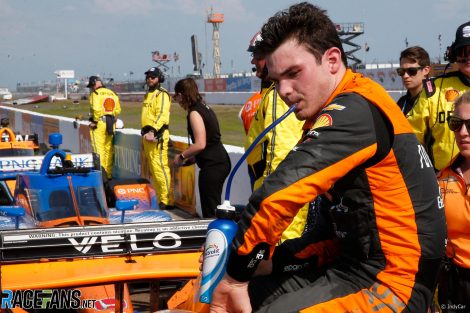A plenum fire happens when a misfire in the engine of a car causes all of the fuel inside the plenum of the fuel injection system to ignite, resulting in a sudden drop in engine torque. Only by lifting off the throttle can the fire be extinguished and the engine can return to full power.
Unless there’s another, more catastrophic engine issue, a sudden plenum event isn’t something that’s visible to onlookers.
However, it was very visible when McLaren Indy driver Pato O’Ward lifted out of the throttle exiting the final corner of the St. Petersburg street circuit with just over three laps to go on Sunday, and let Marcus Ericsson through with ease to snatch the first win of the 2023 IndyCar season from him.
“There was a flaming fire in the engine plenum. And that was just random,” explained O’Ward, who would go on to finish second after holding off Scott Dixon.

And according to McLaren’s lead driver, it’s not a new phenomenon that occurs with the Chevrolet engines that power his number five car. “It comes up randomly,” he said. “You can’t really predict it. So yeah, we just have to have a look into it.”
Last year, during Sunday morning warm-up for the Grand Prix of Mid-Ohio, O’Ward suffered a similar plenum event, as former team principal Taylor Kiel explained at the time. After starting from pole position, O’Ward retired from the race due to a fuel delivery problem.
“It kind of speaks for itself. Right at the exit, we kind of lost drive and gained it back. We were lucky not to get passed by Scott,” he said.
Advert | Become a RaceFans supporter and
The pain O’Ward felt after the race was more evident in what he didn’t say during his post-race interviews on television – or rather, how he struggled to put into words his immense disappointment. Even after a short time to gather himself and speak to the media in the top three finishers’ press conference, his justifiable disappointment could still be felt.
“We just got 10 points thrown away,” he said bluntly. “We started the year like we wanted to, right, but they’re very valuable points at the end of the day.”
“We’ll have a look at all the data and stuff, and then just make sure how for that not to happen.”
O’Ward had inherited the lead after Scott McLaughlin crashed into Romain Grosjean during their battle for the race lead. After a full-course caution, O’Ward got away to an early and decisive advantage, and even as Ericsson began to close in, he felt as if he could have kept Ericsson at bay around the tight, technical street circuit over the final three laps.
“I didn’t have a lot of Push-to-Pass to play with, so I was managing it accordingly, and I think we would have been just fine,” O’Ward reflected. “We were managing a one-second gap, and I don’t think Marcus was going to get us.”
“I don’t know what else to tell you. It’s very unfortunate.”
McLaren’s first race as a team with three full-time entries was one of mixed fortunes. Felix Rosenqvist finished 49 laps down in 19th after extensive repairs to damage suffered in a first-lap, multi-car accident.
But Alexander Rossi avoided the carnage and finished fourth in his first drive for his new team. “It was a shame what happened to Felix at the start. I think the three of us had the potential to all be in the top ten,” Rossi said.
“Today was just keeping your nose clean and staying out of trouble. It was a really good start for the organisation,” he added. “I think we will only get stronger from here.”
Advert | Become a RaceFans supporter and
















